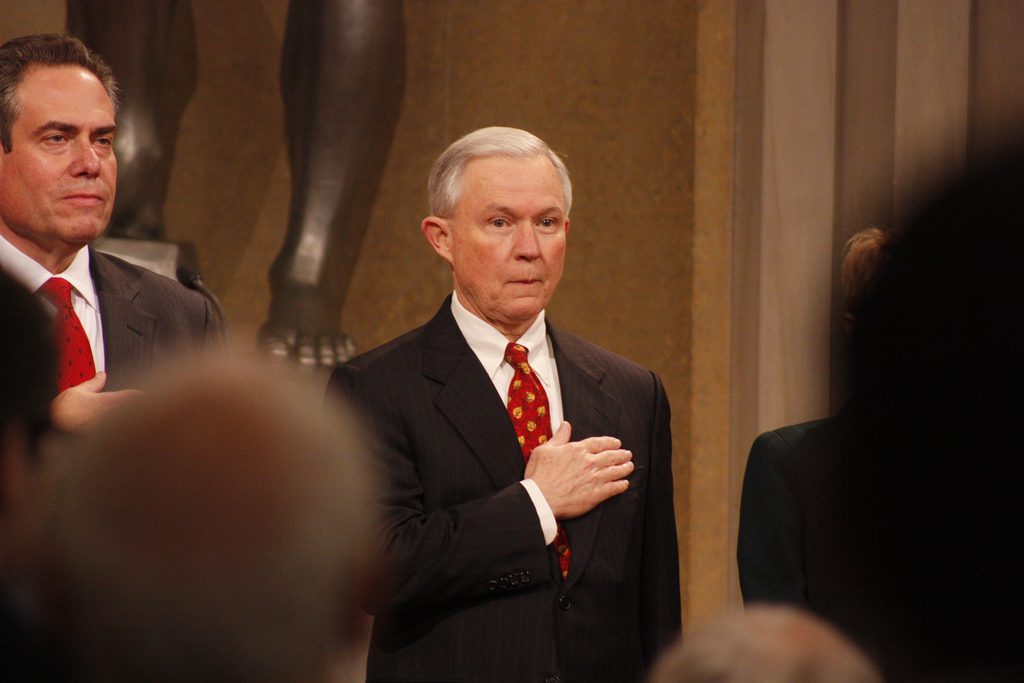Did Attorney General Jeff Sessions Lie to Congress?
With Special Counsel Robert Mueller’s first indictments, new questions have arisen regarding Attorney General Jeff Sessions’ testimony regarding Russia and the Trump campaign. During Sessions’ Judiciary Committee confirmation hearing on January 10, Senator Al Franken asked him what Sessions would do “if there is any evidence that anyone affiliated with the Trump campaign communicated with the Russian government in the course of this campaign.”
Franken was referring to a news report alleging that Russia had compromising material on Trump and Trump surrogates were in contact with the Russian government. Sessions replied that he was “not aware of any of those activities” and said “I have been called a surrogate at a time or two in that campaign and I didn’t have–did not have communications with the Russians, and I’m unable to comment on it.” Sessions followed up in January 17 letter to Senator Patrick Leahy that he, Sessions, had not been “in contact with anyone connected to any part of the Russian government about the 2016 election.
 What Made the Attorney General’s Office Change Their Mind?
What Made the Attorney General’s Office Change Their Mind?
After news about Papadopoulos’s guilty plea emerged, the Attorney General’s office changed it’s tune: “As far as Sessions seemed to be concerned, when he shut down this idea of Papadopoulos engaging with Russia, that was the end of it and he moved the meeting along to other issues.” Instead of being “unaware of any of those activities,” as Sessions had testified under oath in January, the Attorney General thought “It was a bad idea and the Senator didn’t want people to speak about it again.”
Even if we give Sessions the benefit of the doubt that he did everything to discourage meetings with the Kremlin, he should have made these revelations to Congress in January. Instead, Sessions waited until after news of Papadopoulos’s guilty plea to disclose what he has now apparently remembered. These revelations should have been made earlier, especially because Session’s supervisor has been screaming “FAKE NEWS!” whenever a journalist mentioned secret meetings between the Trump campaign and Russia.
What’s truly disturbing is that this is not a single incident. This administration has a history and pattern of making absurd claims which are either easily debunked or which are debunked by later evidence.
But Did He Do it Knowingly and Willfully?
Perjury is the intention act of knowingly or willfully making a false statement while under oath, either verbally or by writing. Statements which are merely false do not constitute perjury. The defendant must know that the statement was false, but made it anyway.
The issue is whether Sessions knew he was making false statement when he said he was “not aware of any activities” between the Trump campaign and Russia, when in fact he was at the meeting when Papadopoulos claimed he could set up connections between Russia and Trump himself. There are two questions that need to be answered before we can determine whether Sessions has committed perjury:
- Did Sessions believe Papadopoulos was speaking as a representative of the Kremlin?
- When Sessions said he was not “not aware of any activities,” did he know that “aware” also included “to discourage?”
If the answer to both questions is yes, then Sessions would be guilty of perjury. If Sessions believed that Papadopoulos represented Russia, then there was a connection between the Trump campaign and Russia right in front of him. If Sessions also knew that discouraging activity between the two was part of the question asked, then Sessions would have committed perjury. If the question had been “Did you encourage activities between the campaign and Russia,” Sessions would not have been stating a falsehood under oath. However, the question is merely about whether the meeting took place, not Session’s reaction to that meeting. If Sessions understood what the question was about, then he would have committed perjury.
Obviously, if Sessions lied under oath, he should at least meet the same punishment as President Clinton: disbarment, if not impeachment. Unlike the President though, Sessions would have to resign from his position anyway because the Attorney General must be an attorney.

 What Made the Attorney General’s Office Change Their Mind?
What Made the Attorney General’s Office Change Their Mind?
Comments